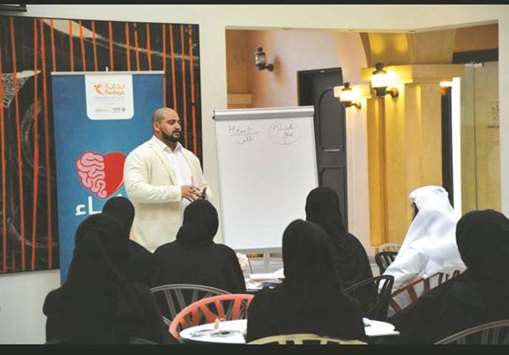The Bedaya Centre for Entrepreneurship and Career Development (Bedaya Centre), a joint initiative by Qatar Development Bank and Silatech, in collaboration with coach Joseph Haddad, recently hosted a workshop to highlight the importance of ‘Emotional Intelligence’.
Bedaya Centre said the workshop aims to demonstrate how emotional intelligence – considered by many as one of the critical factors that sets star performers apart “from the rest of the pack,” taps into a fundamental element of human behaviour that is distinct from one’s intellect.
To give the attendees an understanding on the basics of emotional intelligence and its impact on one’s professional success, the workshop demonstrated how emotional intelligence affects one’s behaviour, navigate social complexities, and make personal decisions that achieve positive results.
Explaining the concept of emotional intelligence, Haddad said: “It is the ability to identify and manage one’s own emotions and the emotions of others. It is generally said to include three skills: emotional awareness; the ability to harness emotions and apply them to tasks like thinking and problem solving; and the ability to manage emotions, which includes regulating one’s own emotions and cheering up or calming down other people.”
According to Haddad, people with higher emotional intelligence are also better at understanding their own psychological state, which can include managing stress effectively and being less likely to suffer from depression.
He said many people had always assumed that the sole source of success is intelligence quotient (IQ). However, a recent article by Harvard Business Review magazine stated that emotional intelligence is a powerful way to focus one’s energy in one direction with a tremendous result and is key to professional success.
“Emotional intelligence is the foundation for a host of critical skills – it impacts most everything one says and does each day. People with higher emotional intelligence find it easier to form and maintain interpersonal relationships and to fit in to group situations,” Haddad said.
Comparing cognitive intelligence or intelligence quotient (IQ) and emotional intelligence, Haddad said: “IQ alone is not enough; EQ also matters. In fact, psychologists generally agree that among the ingredients for success, IQ counts for roughly 10% (at best 25%); the rest depends on everything else, including EQ.”
He said research revealed that people with higher levels of emotional intelligence enjoy more satisfying and successful careers and relationships, and if one think’s about ways to enhance emotional intelligence, he or she is likely to become more charismatic, interesting and attractive to others.
Haddad said communication between one’s emotional and rational “brains” is the physical source of emotional intelligence. He explained that the pathway for emotional intelligence starts in the brain, at the spinal cord.
“Your primary senses enter here and must travel to the front of your brain before you can think rationally about your experience. However, first they travel through the limbic system, the place where emotions are generated. So, we have an emotional reaction to events before our rational mind is able to engage. Emotional intelligence requires effective communication between the rational and emotional centres of the brain,” he said.

Coach Joseph Haddad delivers a lecture the value of emotional intelligence.
